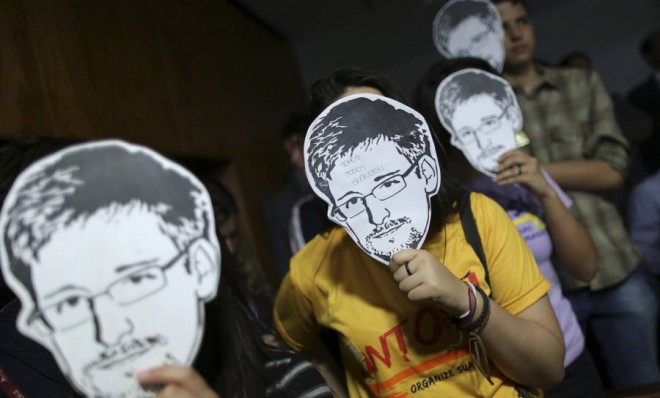Edward Snowden is trying but not traitorous. For all his klutziness, I think he’s a whistleblower in the truest sense, though I doubt his revelations–if that’s what they were–will have much impact. The tools at hand and those to come mean surveillance by the government and leaks by individuals are a permanent part of the landscape. It’s the new abnormal. A discussion of the Internet’s power as oppressor and liberator from a very good interview with Snowden by Katrina vanden Heuvel and Stephen F. Cohen of the Nation:
“The Nation:
This makes us wonder whether or not the Internet actually enhances freedom of speech, and thus democracy? Maybe instead it abets invasion of privacy, reckless opinions, misinformation. What are the Internet’s pluses and minuses for the kind of society that you and The Nation seek?
Edward Snowden:
I would say the first key concept is that, in terms of technological and communication progress in human history, the Internet is basically the equivalent of electronic telepathy. We can now communicate all the time through our little magic smartphones with people who are anywhere, all the time, constantly learning what they’re thinking, talking about, exchanging messages. And this is a new capability even within the context of the Internet. When people talk about Web 2.0, they mean that when the Internet, the World Wide Web, first became popular, it was one way only. People would publish their websites; other people would read them. But there was no real back and forth other than through e-mail. Web 2.0 was what they called the collaborative web—Facebook, Twitter, the social media. What we’re seeing now, or starting to see, is an atomization of the Internet community. Before, everybody went only to a few sites; now we’ve got all these boutiques. We’ve got crazy little sites going up against established media behemoths. And increasingly we’re seeing these ultra-partisan sites getting larger and larger readerships because people are self-selecting themselves into communities. I describe it as tribalism because they’re very tightly woven communities. Lack of civility is part of it, because that’s how Internet tribes behave. We see this more and more in electoral politics, which have become increasingly poisonous.
All this is a blessing and a curse. It’s a blessing because it helps people establish what they value; they understand the sort of ideas they identify with. The curse is that they aren’t challenged in their views. The Internet becomes an echo chamber. Users don’t see the counterarguments. And I think we’re going to see a move away from that, because young people—digital natives who spend their life on the Internet—get saturated. It’s like a fashion trend, and becomes a sign of a lack of sophistication. On the other hand, the Internet is there to fill needs that people have for information and socialization. We get this sort of identification thing going on nowadays because it’s a very fractious time. We live in a time of troubles.”

